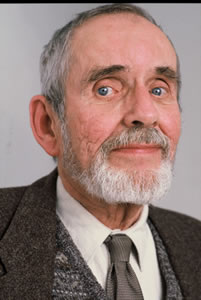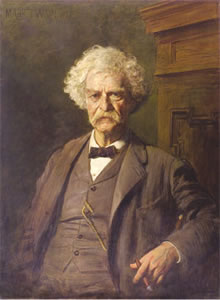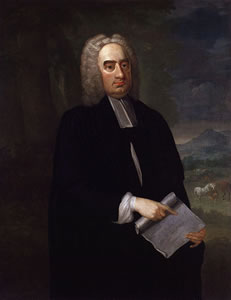De Nederlandse dichter en schrijver Jan G. Elburg werd geboren op 30 november 1919 te Wemeldinge. Zie ook mijn blog van 30 november 2006 en ook mijn blog van 30 november 2007 en ook mijn blog van 30 november 2008 en ook mijn blog van 30 november 2009.
Niets van dat alles
Zoals matrozen zingen…
maar matrozen zingen niet:
zij spugen in de zee,
zij kennen de achterkanten van steden
en de voorkant van de koude wind;
matrozen zingen niet.
zoals de vogels vrolijk…
maar hun vrolijkheid is vluchten:
zij zijn beschoten,
hun jong is dood.
(zij kennen geen droefheid ook).
zoals de zon…
maar zie het rode stof rond boekarest.
wolken? zijn koude mist.
de klaproos? onkruid.
zand: zand.
water: water.
een mens weet nauwlijks wat de mens is.
de dichter weet alles van niets.
Willen
Ik neem mijn buik op en wandel,
ik heb mijn ogen open,
ik heb mijn borst als kennisgeving aangeslagen,
ik zou die punboomhouten paal in mij
vertikaal willen treffen met licht:
een lang lemmet licht om de dagen te turven.
Ik zou een rood totem willen snijden
waarom mijn hartstocht zich als wingerd slingert,
een beeld voor alledag, waaraan de vingers leven.
Ik heb te nemen.
Ik zou een mens willen maken uit wrok
en afgeslagen splinters: een winterman
met een gezicht van louter ellebogen.
En bomen zouden stampen bij zijn langsgaan
en had hij één minuut te leven,
rood zou hij zijn en rood van kindertranen
en rood.
Ik pak mijzelf als altijd weer tezamen,
ik zie het water aan,
ik neem mijn hongerige maag en wandel,
ik zie een eetsalon voor twintig standen:
wanden zijn er genoeg; hij vloekt
van een doorvoeld gemis aan ramen.

Jan G. Elburg (30 november 1919 – 13 augustus 1992)
De Amerikaanse schrijver Mark Twain (pseudoniem van Samuel Langhorne Clemens) werd geboren op 30 november 1835 te Florida. Zie ook mijn blog van 30 november 2006 en ook mijn blog van 30 november 2008 en ook mijn blog van 30 november 2009.
Uit: Adventures of Huckleberry Finn
„After supper she got out her book and learned me about Moses and the Bulrushers; and I was in a sweat to find out all about him; but by-and-by she let it out that Moses had been dead a considerable long time; so then I didn’t care no more about him; because I don’t take no stock in dead people.
Pretty soon I wanted to smoke, and asked the widow to let me. But she wouldn’t. She said it was a mean practice and wasn’t clean, and I must try to not do it any more. That is just the way with some people. They get down on the thing when they don’t know nothing about it. Here she was a bothering about Moses, which was no kin to her, and no use to anybody, being gone, you see, yet finding a power of fault with me for doing a thing that had some good in it. And she took snuff too; of course that was all right, because she done it herself.
Her sister, Miss Watson, a tolerable slim old maid, with goggles on, had just come to live with her, and took a set at me now, with a spelling-book. She worked me middling hard for about an hour, and then the widow made her ease up. I couldn’t stood it much longer. Then for an hour it was deadly dull, and I was fidgety. Miss Watson would say, “Don’t put your feet up there, Huckleberry”; and “don’t scrunch up like that, Huckleberry- set up straight”; and pretty soon she would say, “Don’t gap and stretch like that, Huckleberry- why don’t you try to behave?” Then she told me all about the bad place, and I said I wished I was there. She got mad, then, but I didn’t mean no harm. All I wanted was to go somewheres; all I wanted was a change, I warn’t particular. She said it was wicked to say what I said; said she wouldn’t say it for the whole world; she was going to live so as to go to the good place. Well, I couldn’t see no advantage in going where she was going, so I made up my mind I wouldn’t try for it. But I never said so, because it would only make trouble, and wouldn’t do no good.
Now she had got a start, and she went on and told me all about the good place. She said all a body would have to do there was to go around all day long with a harp and sing, forever and ever. So I didn’t think much of it. But I never said so. I asked her if she reckoned Tom Sawyer would go there, and, she said, not by a considerable sight. I was glad about that, because I wanted him and me to be together.“

Mark Twain (30 november 1835 – 21 april 1910)
De Engelse schrijver Jonathan Swift werd op 30 november 1667 in Dublin geboren uit Engelse ouders. Zie ook mijn blog van 30 november 2006 en en ook mijn blog van 30 november 2008 en ook mijn blog van 30 november 2009.
Uit: Gulliver’s Travels
„Soon after my return from Leyden, I was recommended by my good master Mr. Bates, to be surgeon to the Swallow, Captain Abraham Pannell commander; with whom I continued three years and a half, making a voyage or two into the Levant, and some other parts. When I came back, I resolved to settle in London, to which Mr. Bates, my master, encouraged me; and by him I was recommended to several patients. I took part of a small house in the Old-Jury; and being advised to alter my condition, I married Mrs. Mary Burton, second daughter to Mr. Edmond Burton, hosier, in Newgate-street, with whom I received four hundred pounds for a portion.
But, my good master Bates dying in two years after, and I having few friends, my business began to fail; for my conscience would not suffer me to imitate the bad practice of too many among my brethren. Having therefore consulted with my wife, and some of my acquaintance, I determined to go again to sea. I was surgeon successively in two ships, and made several voyages, for six years, to the East and West-Indies; by which I got some addition to my fortune. My hours of leisure I spent in reading the best authors, ancient and modern; being always provided with a good number of books; and when I was ashore, in observing the manners and dispositions of the people, as well as learning their language; wherein I had a great facility by the strength of my memory.
The last of these voyages not proving very fortunate, I grew weary of the sea, and intended to stay at home with my wife and family. I removed from the Old-Jury to Fetter-lane, and from thence to Wapping, hoping to get business among the sailors; but it would not turn to account. After three years expectation, that things would mend, I accepted an advantageous offer from Captain William Prichard, master of the Antelope, who was making a voyage to the South-Sea. We set sail from Bristol, May 4th, 1699, and our voyage at first was very prosperous.

Jonathan Swift (30 november 1667 – 19 oktober 1745)
Portret door Francis Bindon
